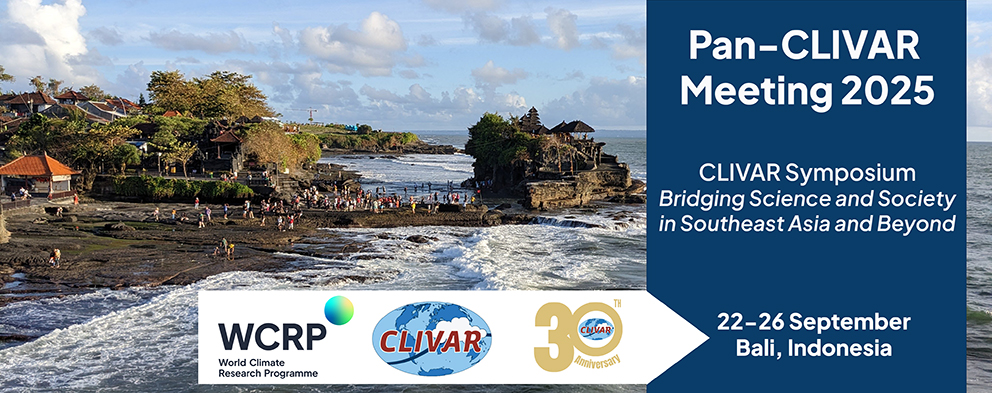The call for abstracts is now closed
- Deadline for submission of abstracts: extended to 18 April 2025 (23h59 CEST)
CLIVAR Symposium: Bridging Science and Society in Southeast Asia and Beyond
The Pan-CLIVAR 2025 will be held in Indonesia, at the heart of the Indo-Pacific Warm Pool, a key component of the global climate system. The archipelago, made up of more than 17,000 islands, is a conduit for the Indonesian Throughflow (ITF) that transports a huge amount of water from the Pacific into the Indian Ocean at the rate of 15 million cubic meters per second. The warm pool anchors the main centre of the world's tropical convection - the engine room of the global atmospheric circulation. Indonesia and the surrounding countries in Southeast Asia are susceptible to the impacts of climate variability and change. Climate phenomena such as the El Niño Southern Oscillation (ENSO), Indian Ocean Dipole, Madden Julian Oscillation, and Monsoons variability, directly affect agriculture, fisheries, environment, economy, and thus livelihood and societal well-being in the region. The impacts are often conveyed through interactions with complex ocean and atmospheric processes at various temporal and spatial scales (e.g., compound events, marine heatwaves, atmospheric rivers, droughts, floods, cyclones, biogeochemical and sea level extremes, etc.).
Ocean-atmosphere processes across tropical oceans, and in the extratropics, including the Arctic and Antarctica, interact with one another leading to changes in climate variability that in turn impact various components of the climate system, affecting heat and freshwater exchanges (e.g., via the ITF, the Atlantic Meridional Overturning, and large-scale tropical atmospheric cells), biogeochemistry and the carbon cycle. All these processes and their impacts are occurring in the backdrop of a changing global climate. Improving our understanding of these complex processes requires advances in observations, theory, and modeling of all ocean basins, supported by technological advances, and an inclusive international collaboration. This will lead to more accurate climate predictions and projections that can be reliably utilized by society to manage risks and resources in a changing climate.
The symposium calls for the scientific community to address all of the aforementioned topics, highlighting the recent progress, gaps and challenges. Abstract submissions are open for the following overarching themes:
- Climate Variability and Change
- Ocean Processes and Extremes (e.g., MHW, sea level rise, Indonesian throughflow)
- Atmospheric Processes and Climate Dynamics (e.g., Monsoons, inter-basin interactions)
- Cascading and Compound Events
- Biogeochemical Processes and Climate Interactions
- Artificial Intelligence: Role in Climate-Ocean Research and Prediction
- Ocean-Climate Observations and Modelling
- Societal Impact
To access the abstract submission form, create an account through the login button (select the small arrow next to the login button) at the top right side of the website. You'll then have a private space to submit your abstract.
Requirements
Submission of an abstract implies that organizers have permission to reproduce the abstract in the program and reports related to the conference.
Instructions
The call for abstracts is open for oral and poster presentations. If you are submitting an abstract, you must be the presenter and first author.
- Authors will have to submit the abstracts in ENGLISH
- The number of submission per contributor is limited to 1 abstract
- For each submission, select only one of the following topics in the submission form:
- Climate Variability and Change
- Ocean Processes and Extremes (e.g., MHW, sea level rise, Indonesian throughflow)
- Atmospheric Processes and Climate Dynamics (e.g., Monsoons, inter-basin interactions)
- Cascading and Compound Event
- Biogeochemical Processes and Climate Interactions
- Artificial Intelligence: Role in Climate-Ocean Research and Prediction
- Ocean-Climate Observations and Modelling
- Societal Impact
- Make your abstract as informative as possible. The abstract is limited to 300 words.


